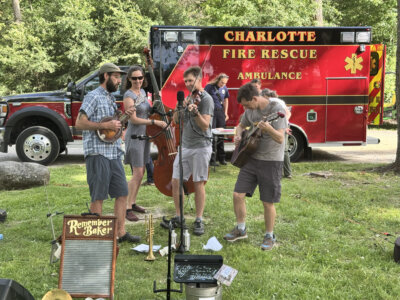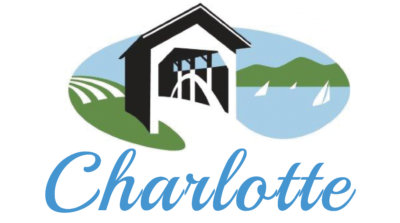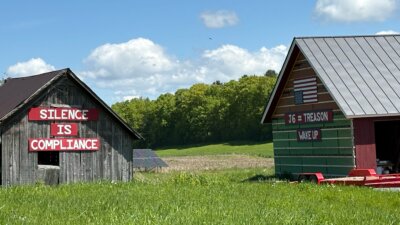Pineapple sign stolen from Inn at Charlotte

The pineapple is commonly known as a sign of hospitality; last week, someone did a most inhospitable thing to the owner of the Inn at Charlotte. The inn’s landmark carved-wood pineapple sign was stolen in the night; the owner, Duker Bower, who also lives on the property, is hoping to get it back—and if that’s not possible, to see if anyone has a photo of it. He’d like to have the memory of it, and he can’t afford to buy a new sign.
Bower said that he noticed the sign was missing on Dec. 17, and figured it must have been stolen in the early hours at that morning, when traffic past the Route 7 and State Park Road inn was quiet and the Charlotte winter sky was dark. “It wasn’t that easy to steal,” Bower said. “It had four chains holding it into position…they must have had a bolt cutter or something.”
The sign, which Bower, who is an artist, designed, cut, and painted himself, was made by Monkton artist and sign maker Homer Wells, who works with metals and auto paint to create works of art that can withstand the elements. It featured the name of the inn and a carved pineapple, which Wells enhanced with cut metal letters placed on posts so they became three-dimensional.
“It was a fairly sophisticated sign,” Bower said. “It would basically last forever out in the weather. It was a beautiful sign.”
A pineapple might seem slightly out of place at a B&B in a Vermont farm town, but Bower said the fruit is a well-known symbol of welcome. “The pineapple goes back to the days of tall ships plying the seas,” he said, “and sailors would land in exotic places and pick up exotic things to return with when they go home to friends and family. One of those was a pineapple, and through that process the pineapple became a symbol of hospitality and togetherness. I liked that tradition.”
The Inn at Charlotte sign wasn’t large—Vermont law only allows businesses one sign, and it can only be six square feet total—but it meant something to Bower. He said slightly wistfully that he was joking when he called it a landmark; the sign, however, was definitely one of the clear indicators to travelers that they were indeed in Charlotte. “It’s a pity,” he said.
Bower was filing a police report this week and wasn’t feeling very optimistic that the sign would turn up again. He had hung on to his old business sign, so is thinking of spiffing it up and putting it out, though he said business is at a bit of a standstill at the moment.
“Given covid circumstances, there’s no business,” he said. “No one is coming and quarantining for two weeks, and no one can afford to even stay at a B&B for 14 days, so I’m just trying to get by—the sign is not particularly necessary at this moment anyway. I’m taking my time, and when the weather gets right I’m going to sand down the old sign and try and fix it up.”
The sense of loss from having something treasured stolen is rarely about the monetary value or the thing itself. “It’s not a good feeling,” he said. “It’s of no use to anyone, it’s not even iconic, even, in the sense of a Coca Cola sign or some cool old farm equipment sign—it’s the Inn at Charlotte. I don’t even know what good it does anyone. So that’s disappointing.”
Bower said the memory of working with Wells was special. “That was a good experience, but I can’t afford to make another one,” he said. He is a painter and sculptor, and works from his studio at the inn, and said that though he’s good at documenting his work, he never actually took a photo of the Inn at Charlotte sign. He hopes that if someone out there has one, they’ll let him know.
Related Stories
Popular Stories
If you enjoy The Charlotte News, please consider making a donation. Your gift will help us produce more stories like this. The majority of our budget comes from charitable contributions. Your gift helps sustain The Charlotte News, keeping it a free service for everyone in town. Thank you.
Andrew Zehner, Board Chair










